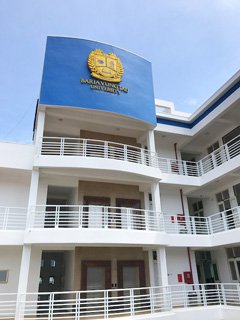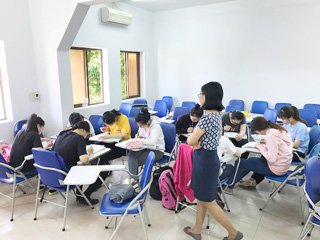Even in Regional Areas, Japanese-Language Learners Are Doing Their Utmost!
Ba Ria - Vung Tau University
SASAMURA Haruka
Ba Ria-Vung Tau?
Vietnam is a popular tourism destination from Japan, but I think there are still very few people who know the place name “Ba Ria-Vung Tau.” Vung Tau City in Ba Rịa-Vung Tau Province, where I have been dispatched, is around two and a half hours by bus from the major city of Ho Chi Minh. It is a pretty and laidback seaside town. Oil and gas are mined off the coast of Ba Ria-Vung Tau, making it an important energy base. Progress is also being made with attracting Japanese companies, and so the province too is placing an emphasize on Japanese-language education. Some of the local high schools are even introducing Japanese as a second foreign language.

It is a new university
Baria Vungtau University is the only four-year higher education institution in the province, and is a relatively new private university, having been founded in 2006. Because it still has a very short history, one gets the impression that its goals and direction as a university are not clear, and it is impossible to tell what sort of system will be in place in a few months’ time. That said, the lack of a set direction for the university also has the advantage of making it easy to start new things. One of them is to widen opportunities for Japanese-language learning to students taking science courses. Up to now Japanese-language classes had only covered students majoring in the Japanese language and students majoring in English who study Japanese as a second foreign language. From this summer, however, students of other faculties, including science faculties, became eligible to study it as well. This proposal was sudden and unforeseen, but the Vietnamese Japanese-language teachers in charge and I put our heads together and began working towards creating new classes and a new curriculum.
I am currently involved in three core pillars here – teaching students, supporting teachers through study sessions, and curriculum development.
“Students Who “Try Hard” and Students Who “Want to Try Hard”
Depending on the class, classes for students majoring in Japanese have close to 40 students in them, and while you are in the university you are surrounded by the sound of words and phrases being repeated in loud voices. However, when there are close to 40 students in a class, the reality is that ultimately the lesson tends to take on a lecture format and it is not possible to allocate time to “using the Japanese language.” Students with a strong desire to use Japanese actively interact with Japanese teachers, enjoy using Japanese on Facebook and so on. Additionally, outside of the classroom they hold study sessions in groups in the university’s empty classrooms or shared spaces, and I also often see students studying silently on their own. Students who have goals, such as becoming a Japanese-language teacher, an interpreter, or studying in Japan, set aside time and engage in their learning.

The catch-up class studies as a group!
On the other hand, one aspect of this university, and one challenge it faces, is that there is a large number of students who say “It is not as though I wanted to study the Japanese language.” As an initiative to address these students, from the current semester I established a catch-up class. This class is aimed at students who end up getting “buried” in large classes and consequently never clarify areas they do not understand. The catch-up classes aim to allow these students to ask questions or discuss things without feeling hesitant. I am in charge of this class, but fourth-year students who aspire to become Japanese-language teachers are also kind enough to get involved as supporters each week. Having more senior students to talk to also means that the students participating in the class can ask questions without feeling nervous. Additionally, these fourth-year students no doubt also serve as very good and familiar role models for the students taking the class.
The catch-up class is only a makeshift solution. The first priority is to improve the classes and curriculum for students majoring in Japanese to reduce the number of students who need to catch up by as many as possible. However, I intend to continue to set up opportunities like this as chances for students who lack confidence to engage in learning in a relaxed atmosphere, although I may adjust the format.
Busy Vietnamese Japanese-Language Teachers
Vietnamese teachers balance classes and meetings with housekeeping and childrearing, and so live extremely hectic lives. Despite being so busy, every week they hold study sessions that double as lesson preparation, in order to ensure that they are able to teach intermediate and higher-level classes confidently.
When the study sessions initially started, they involved me taking the lead and doing the explaining, but now the discussions at the sessions are always held in Vietnamese, and cover topics such as what the best way is to explain abstract words to students, or what sort of example sentences to present to help students understand. I do not understand the discussions in Vietnamese, but these conversations are mixed with laughter and the occasional disagreement, and I am certain the teachers are engaging in deep discussions. These sessions take up time, but I view them as “study sessions” in the true sense of the phrase.
Challenges and Goals Going Forward
I believe my job is to “create opportunities” for both the students and the Vietnamese teachers. Opportunities for the students to use Japanese, opportunities for the students to communicate in Japanese, opportunities that give the students confidence, opportunities for the teachers to study, opportunities that give the teachers confidence, and opportunities that bring the teachers together. If I can just come up with opportunities, university students and teachers will make up the other half. My view is that if I provide encouragement, the students and teachers will come up with ideas that are a good fit with Baria Vungtau University.
When I write this report next time, I want to be able to report that one or two of those ideas has taken shape. Toward that end, as one member of the university, I will work closely with students and Vietnamese teachers while applying myself to my daily activities.
- What We Do Top
- Arts and Cultural Exchange [Culture]
- Japanese-Language Education Overseas [Language]
- Japanese-Language Education Overseas [Language] Top
- Learn Japanese-language
- Teach Japanese-language
- Take Japanese-Language Test
- Know about Japanese-language education abroad
- The Japanese-Language Institute, Urawa
- The Japanese-Language Institute, Kansai
- Japanese-Language Programs for Foreign Specified Skilled Worker Candidates
- Japanese Language Education for Japanese Children Resident Overseas and for the Descendants of Migrants
- Archives
- Japanese Studies and Global Partnerships [Dialogue]
- JF digital collection
- Other Programs / Programs to Commemorate Exchange Year
- Awards and Prizes
- Publications
